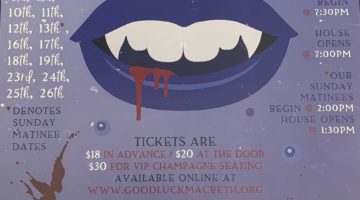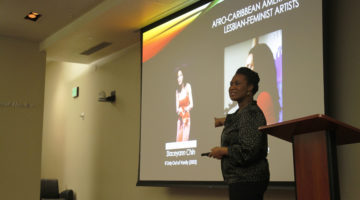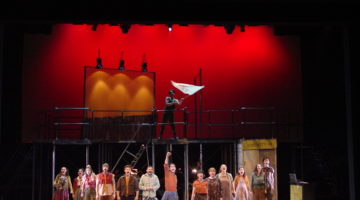
Sandra Neace’s A Free Man is more of a public staged reading rather than a play, and will be performed Thursday through Saturday, Sept. 20-22.
Theatrical productions usually follow a one-way path — an assembly line of sorts. The playwright writes the words, the director interprets them to create an overall vision and the actors perform them for a passive audience. However, the theatre department’s upcoming staged reading of “A Free Man” will challenge this definition of theatrical performance. Instead of following the usual path, this play will be part of a reciprocal process — a discussion between the playwright, the director, the actors, and even the audience, where all ideas and perspectives are taken into account and allowed to influence the final product.
“A Free Man” is written by Sandra Neace, theatre department advisor, and is being directed by Adriano Cabral, assistant professor of theatre. The play is about a woman named Carlina who struggles with body image issues, relationship issues, an opioid addiction and who has hallucinations of Elvis Presley. Although this description may sound amusing at first, Cabral insists it “is not a comedy”.
“There are moments of levity to it,” Cabral said. “It is a little blend of realism and surrealism. There’s a little bit of magic to it.”
This performance is a staged reading rather than a full production, meaning the actors will have their scripts with them onstage and there will be minimal costumes, props and lighting. This allows for a short rehearsal process of one week, and allows more space for developing the text of the play. In a staged reading, the play is an ever-changing entity rather than a pre-made, set-in-stone story.
“[The actors] are actually going to be able to offer their input as humans in the room on how this language feels. And then the playwright, taking all that information in, will be able to shift the script,” said Cabral.
Cabral says he chose to stage a reading of Neace’s play in particular because he thinks it is important to showcase the multi-faceted talents of the theatre department’s faculty.
“I love Sandy’s work,” said Cabral. “One of my desires is to incorporate a world premiere of a new play in our season every year. I think that’s something academia is well suited to do.”
After four years of working on this play, Neace says she feels it is close to complete. However she has some anxiety about showing her work to an audience, which she and Cabral both openly acknowledge.
“I am nervous. I feel vulnerable in it,” she said. “But I’m so fortunate to work at a university that will give it this reading. And to have a person like Adriano on my side is wonderful. He is a cheerleader.”
“She was super nervous,” said Cabral. “Because she’s a director and she’s an actor, sharing her words with someone is such a vulnerable thing to do.”
However, Cabral saw the nerves as a positive thing.
“When I talked to her and I noticed she was scared, [I was] like, ‘Oh! This was the right choice, then.’ It’s not just going to be a challenge for the students, it’s going to be a challenge for us as faculty members as well.”
Cabral chose his actors with the specific needs of this process in mind. During the auditions, he kept an eye out for actors who were able to connect with the text and make big choices even while they were reading off a page.
“These particular people came in and made really bold choices, even with cold readings,” said Cabral. “So it wasn’t just, ‘I picked up this piece of paper and now I am reading the words that are in front of me at you’. They took risks.”
Even the audience will be able to take part in the process. After each performance, there will be a twenty-minute talkback for the audience to discuss the play and the creative process with the cast.
After the weeklong rehearsal process, the cast will perform for an audience September 20-22 at 7:30 p.m. in the Redfield Studio Theatre. Admission is free.












